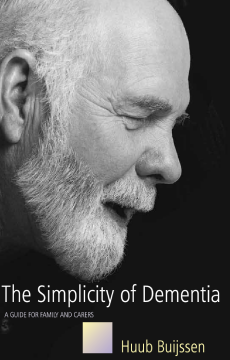
Additional Information
Book Details
Abstract
This book offers an accessible and sympathetic introduction for relatives, carers and professionals looking after or training to work with people with dementia.
Drawing on the two `laws of dementia', the author explains the causes of communication problems, mood disturbances and `deviant' behaviours, with particular emphasis on how these are experienced by dementia sufferers themselves. Case examples demonstrate the typical symptoms and progression of dementia, and clear guidance is provided on how to support dementia sufferers at every stage and help them deal with the challenges posed by their condition.
Relatives and carers will find this book a source of essential information and encouragement to deal confidently with the difficulties posed by the condition both for people with dementia and those around them.
`The Simplicity of Dementia has much to offer in terms of thoughtful, practical advice on caring for someone with dementia.'
Ageing and Society, Cambridge Journals
`Aimed at families and carers, I found the content of this book to contain a vast amount of information, well written and understandable to those people who may be experiencing dementia for the first time. The chapters describe the experiences of dementia using a number of real-life examples which bring this person-centred book to life. It explores issues of communication, mood and behaviour problems, management guidelines and has a chapter on the family and the problems they experience, including feelings of guilt.
The author bases this book not only on his professional outlook as a psychogerontologist and clinical psychologist, but also as a son, whose own father suffered with dementia. It brings the book to a more interesting level for me knowing the author has lived through the personal effects of dementia.'
Signpost
Huub Buijssen is a psychogerontologist and clinical psychologist and has written many successful books on the subject of dementia. He regularly lectures to relatives and carers of dementia sufferers.
`This well-structured guide offers nine chapters about dementia, written for relatives, carers and professionals… This book offers a clear, simple overview of this complex disease process.'
Dementia: The International Journal of Social Research and Practice
`The author provides a very person-centred approach to discussing the experience of dementia and offers guidelines for family caregivers and professional cares. This jargon-free text includes the voices of relatives, people with dementia and nurses…Very clear explanations are provided to explain personality changes caused by the disease such as: anxiety, blame, suspicious behaviour, depression and hoarding of foods or goods. These are crucially dealt with early in the book and explained sympathetically from the point-of view of the person with dementia… This is essential reading for anyone who is involved in caring for a person with dementia. It is much more readable than a textbook- not one scan picture in sight. The theme is people- their expereices as sufferers, family caregivers or professional carers. It is pocket size and the chapters can easily be read at intervals. The insights gained will clearly increase the satisfaction of caring for the person with dementia'.
London Centre of Dementia Care :www.ucl.ac.uk
`Relatives and carers will find this book a source of essential information and encouragement to deal confidently with the difficulties posed by the condition both for people with Dementia and those around them'.
Working with Older People Vol:9 Issue 3, Sept 2005
Table of Contents
| Section Title | Page | Action | Price |
|---|---|---|---|
| Introduction | |||
| Bernd Hamm and Pandurang K. Muttagi 1 | |||
| Part i | |||
| Concepts, Theories, Problems | |||
| Understanding Sustainable Development | |||
| William E. Rees 19 | |||
| Sustainable Development—A Third World Perspective | |||
| P.K. Muttagi 43 | |||
| Sustainability Problems and Historical Transitions—A | |||
| Description in Terms of Changes in Metabolism and | |||
| Colonization Strategies | |||
| Marina Fischer-Kowalski and Helmut Haberl 57 | |||
| The New Politics of Environmental Governance: Sustainable | |||
| Development on the Way to the Next Millennium? | |||
| On-Kwok Lai 77 | |||
| Challenges to Sustainability: Risk Perceptions by 'Lay People' | |||
| and Experts | |||
| Nikolai Genov 101 | |||
| Property Rights as a Tool for Desirable Development | |||
| Peter Marcuse 121 | |||
| The Future of Mega-cities: Planning Implication for a More | |||
| Sustainable Development | |||
| Salah El-Shakhs 133 | |||
| Part II | |||
| Regional Perspectives | |||
| The New Politics of Environmental Governance Environmental | |||
| Sustainability and Life in the City: A Challenge for the Design | |||
| Professions | |||
| Charles Middleton 147 | |||
| Local Self-Government for Sustainable Development: The | |||
| Philippines | |||
| Alex B. Brillantes 159 | |||
| Sustainable Development in Developing Societies: The Case of | |||
| Planning Sustainable Urban Development under | |||
| Post-communist Conditions | |||
| Miroslaw Grochoivski 167 | |||
| Sustainable Development or Loss of Cultural Urban Identity? | |||
| Ljubinko Pusic 185 | |||
| Part III | |||
| Local Answers | |||
| Sustainable Urban Management: Opportunities and Risks of | |||
| Information Technology | |||
| Ulrike Weiland and Lorenz Hilty 197 | |||
| Sustainable Communities: Planning for the 21st Century | |||
| William E. Rees and Mark Roseland 203 | |||
| Sustainable Development in Developing Societies: The Case of | |||
| Isfahan Region | |||
| Asghar Zarrabi 223 | |||
| Sustainable Development in Urban Design: A Northern Aspect | |||
| Aarne Tarutnaa 231 | |||
| Katowice—Economic Structure and Sustainable Development | |||
| Irena Jedrzejczyk Inge Osthoff 261 | |||
| The Messages of Folk Architecture | |||
| Jadranka Veselic-Bruvo 271 | |||
| Ecological Urban Development: An Experiment in Active | |||
| Learning | |||
| Bernd Hamm 283 |
